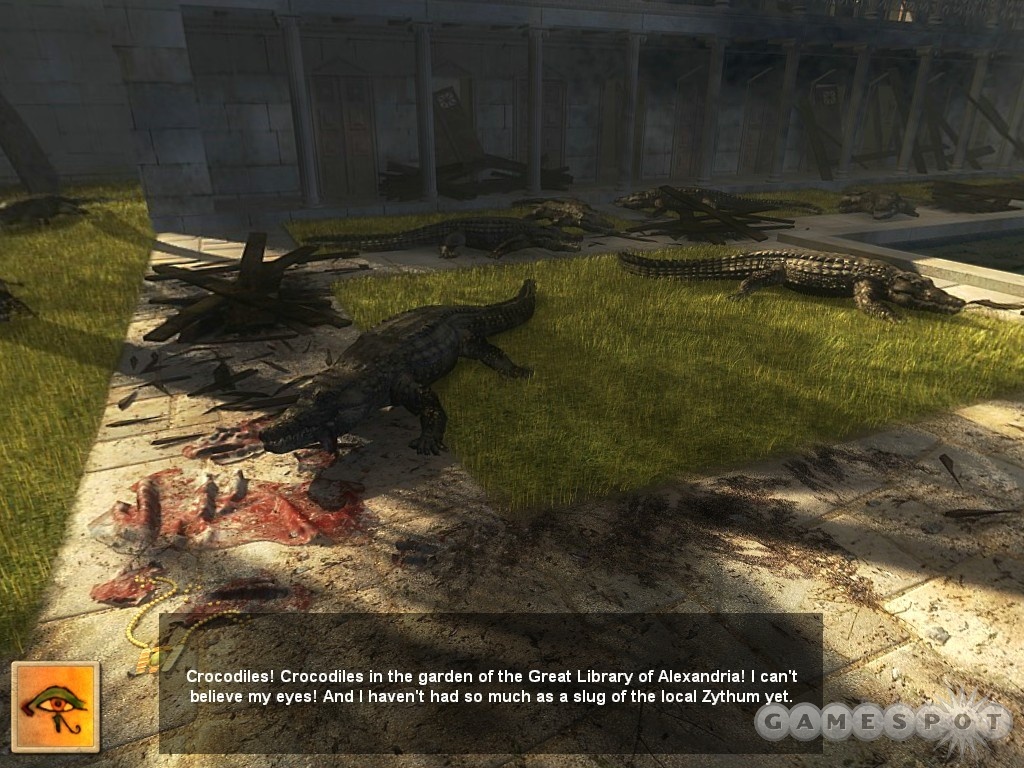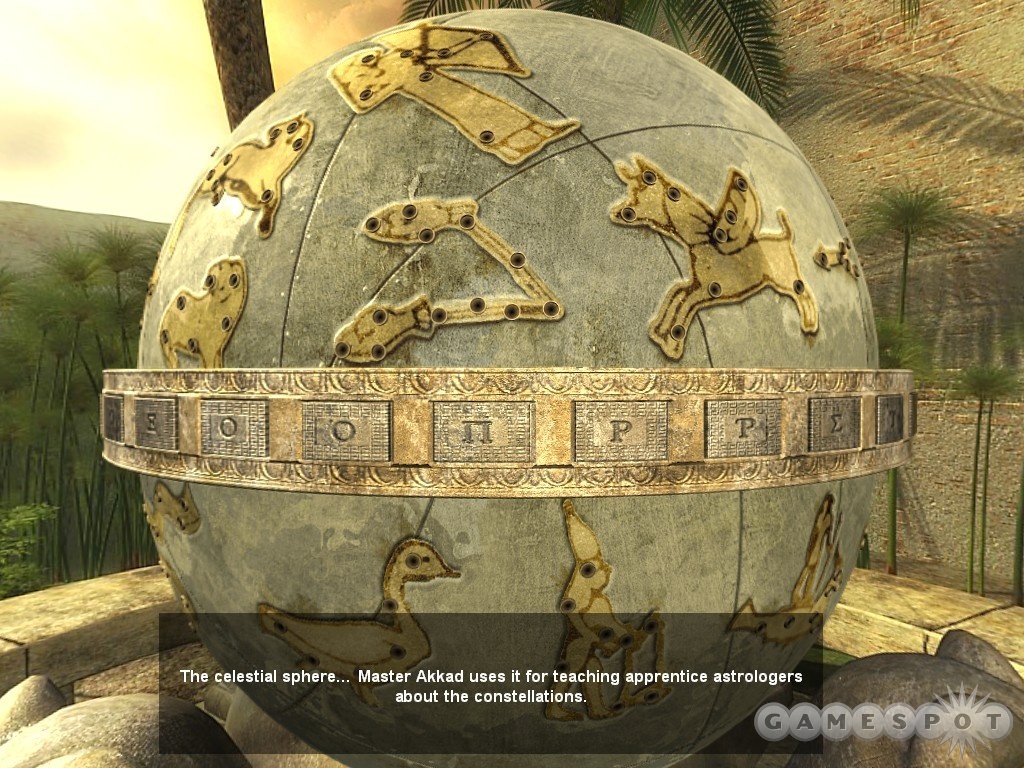"Ancient" describes both the setting and the gameplay of Cleopatra: Riddle of the Tomb. This adventure from French developer Kheops Studio (previously released in Europe as Cleopatra: A Queen's Destiny) never strays from point-and-click conventions, spinning a predictable yarn where you collect random pieces of junk and work out traditional puzzles involving code wheels and the like. However, an ancient Egyptian setting that feels like more than just window dressing, along with enigmas authentic to the era, make the game more playable than it would normally be in this day and age.

You take on the role of Thomas, an apprentice astrologer plying his trade in Alexandria during the civil war between Cleopatra and her brother/husband (those Egyptians really knew how to live) Ptolemy. As the city is torn apart by rioting mobs, Thomas is drawn into the fray due to the mysterious disappearance of his true love Iris and her father, chief astrologer Akkad. Cue the stereotypical adventure-game scavenger hunt, this time in search of ancient secrets that will enable Cleopatra to obtain an oracle's reading about whether or not she needs to hook up with Julius Caesar to save Egypt. Yes, seriously.
So, yeah, the plot is a bit goofy. But much of the story also rings true, due to authentic touches clipped from the history books. The plot revolves around the historic rivalry between Cleopatra and her brother that led to the queen's infamous dalliances with Rome's hottest dictators and demagogues. Greek text is used throughout the game, which is perfectly accurate for the period in question since Alexandria had been the capital of a de facto Greek state for some three centuries by this point. It was actually pretty impressive to see this touch, since most games instantly equate all things Egyptian with hieroglyphics. Many puzzles slip in ancient gadgets and geegaws such as a clepsydra water clock and ushabti funerary statues. Thomas' quests take place in legendary locations like the Pharos Lighthouse and the Library of Alexandria, all of which are brought to life with respectable, if formulaic, visuals that immerse you in a land of pyramids, sphinxes, and crocodiles. And the audio quality is generally fantastic, due to a bouncy score reminiscent of a slowed-down belly-dancing tune and atmospheric effects that take full advantage of surround-sound systems.
Only a few features are out of place. You have to pick a birth sign from the traditional 12 symbols of the zodiac at the start of the game, which seems awfully new agey in a game otherwise steeped in Egyptian history. The horoscope mechanic it governs is kind of weak, too, as whatever sign you pick determines whether you're going to have a good day and need fewer puzzle pieces, or have a bad day and need more. Much of the script and voice acting seem out of place. Too many modern phrases have crept into the dialogue (although the script is better than you're led to believe it will be by the game box, which has "Across the Scorching Red Dessert" emblazoned in huge type on the inside front flap) and the voice actors often rip through their lines as if they were late for a bus.
Gameplay in Riddle of the Tomb is more commonplace. You walk through mostly static locations with step-and-swivel movements where you walk forward to set positions and then whirl the mouse around looking for objects to play with or items to pick up. As usual with these sorts of old-school adventures, there isn't a lot of rhyme or reason to the items you collect. Basically, if you can pick it up, you'd better pick it up, even if it serves no obvious purpose at the moment. At least there are no pretensions here, though. You know what you're in for from the very first location, which is strewn with all kinds of apparently random detritus like broken sticks, buckets of tar, a leather strap, and an iron hook. From here on out you need to gather crap that litters the ground across Alexandria like some kind of an ancient environmentalist. See fillets of dried fish? Grab 'em. Run across a needle and thread? Pocket them. Spot some chain mail? Ditto.

But playing kleptomaniac actually makes sense in the context of the game. There are no tremendous leaps of logic here, just a real lack of imagination when it comes to scattering puzzle-solving paraphernalia all through the game locales. So it's generally pretty easy to figure out how you're supposed to utilize items once you have them in your possession. How to make ushabti figurines for the crazy crocodile worshipper isn't hard to determine given the nearby location of a workshop stocked with clay and a fire pit. Rubble, a chisel, and a wooden frame practically tell you how to craft a new stone ball for use in a catapult. That sort of thing. All you have to do is grab everything that isn't nailed down, take a look at your goals, and then start combining items in your inventory menu. Only the set-piece logic puzzles slow you down, and they're fairly simple to work through as long as you pick up all of the hints hidden on papyri and in wall inscriptions. Most of these brainteasers really lay on the ancient theme, too, bulking up the atmosphere with you spelling names in Greek letters, arranging god figurines to mimic the weighing of the soul ceremony performed by Anubis, and mashing up powders and plants like an alchemist.
In some ways, Cleopatra: Riddle of the Tomb proves that you don't need to reinvent the wheel. Traditional adventure games may seem awfully creaky at this late date, but there is something to be said for a new release that sticks so close to the old formula yet still manages to tell a tale that most adventurers will want to finish.